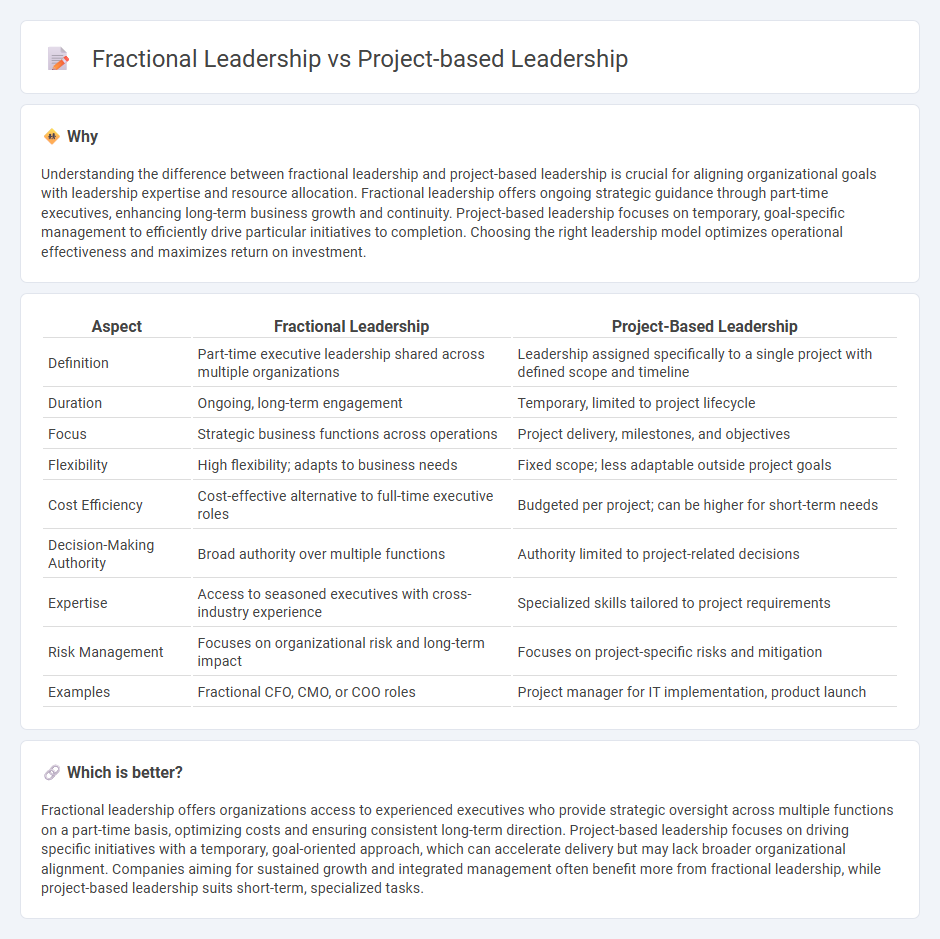
Fractional leadership offers ongoing, part-time executive expertise aligned with long-term strategic goals, while project-based leadership focuses on temporary management dedicated to specific project completion. Organizations benefit from fractional leaders by maintaining consistent vision and operational continuity without full-time costs, contrasting with the tactical, milestone-driven approach of project leaders. Explore how choosing between fractional and project-based leadership can optimize your management strategy.
Why it is important
Understanding the difference between fractional leadership and project-based leadership is crucial for aligning organizational goals with leadership expertise and resource allocation. Fractional leadership offers ongoing strategic guidance through part-time executives, enhancing long-term business growth and continuity. Project-based leadership focuses on temporary, goal-specific management to efficiently drive particular initiatives to completion. Choosing the right leadership model optimizes operational effectiveness and maximizes return on investment.
Comparison Table
| Aspect | Fractional Leadership | Project-Based Leadership |
|---|---|---|
| Definition | Part-time executive leadership shared across multiple organizations | Leadership assigned specifically to a single project with defined scope and timeline |
| Duration | Ongoing, long-term engagement | Temporary, limited to project lifecycle |
| Focus | Strategic business functions across operations | Project delivery, milestones, and objectives |
| Flexibility | High flexibility; adapts to business needs | Fixed scope; less adaptable outside project goals |
| Cost Efficiency | Cost-effective alternative to full-time executive roles | Budgeted per project; can be higher for short-term needs |
| Decision-Making Authority | Broad authority over multiple functions | Authority limited to project-related decisions |
| Expertise | Access to seasoned executives with cross-industry experience | Specialized skills tailored to project requirements |
| Risk Management | Focuses on organizational risk and long-term impact | Focuses on project-specific risks and mitigation |
| Examples | Fractional CFO, CMO, or COO roles | Project manager for IT implementation, product launch |
Which is better?
Fractional leadership offers organizations access to experienced executives who provide strategic oversight across multiple functions on a part-time basis, optimizing costs and ensuring consistent long-term direction. Project-based leadership focuses on driving specific initiatives with a temporary, goal-oriented approach, which can accelerate delivery but may lack broader organizational alignment. Companies aiming for sustained growth and integrated management often benefit more from fractional leadership, while project-based leadership suits short-term, specialized tasks.
Connection
Fractional leadership provides organizations with part-time, expert executives who drive strategic initiatives without the full-time commitment, closely aligning with project-based leadership that focuses on accomplishing specific goals within set timelines. Both leadership models emphasize flexibility, cost-efficiency, and targeted expertise, enabling businesses to adapt quickly to changing project demands and market conditions. Integration of fractional leadership into project-based frameworks enhances decision-making agility and resource allocation for complex, short-term projects.
Key Terms
Accountability
Project-based leadership centers on accountability by assigning specific leaders to oversee discrete projects, ensuring clear responsibility and measurable outcomes within set timelines. Fractional leadership distributes accountability across multiple roles or departments, leveraging part-time executives to drive continuous strategic initiatives without full-time commitments. Explore the distinct accountability structures and benefits of each approach to determine the best fit for your organization's leadership needs.
Decision Authority
Project-based leadership typically grants decision authority limited to the scope and duration of a specific project, allowing leaders to make choices that directly impact project outcomes without extending beyond that framework. Fractional leadership involves part-time or temporary executives who hold ongoing decision authority across broader organizational functions, influencing strategic and operational directions with a more integrated approach. Explore how decision authority dynamics differ between these leadership models to determine the best fit for your organization's needs.
Commitment Duration
Project-based leadership involves a finite commitment centered on specific project timelines, which typically lasts from a few months to a year, ensuring focused expertise during critical phases. Fractional leadership offers an ongoing, flexible commitment where executives dedicate a part of their time, often over multiple years, supporting continuous strategic needs across business functions. Explore detailed comparisons on commitment duration and benefits to determine the best leadership model for your organization.
 dowidth.com
dowidth.com